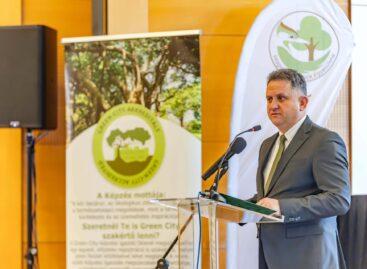Hungary will not be caught unprepared by the drought
It is not yet known how severe this year’s drought will be and what consequences it will have, but the government and the water industry will not be caught unprepared by the drought – stated the State Secretary for Agriculture of the Ministry of Agriculture on Friday at the temporary water abstraction facility built on the banks of the Tisza, near Csépa.

(Photo: AM/Tibor Vermes)
Imre Hubai said: specialists from the Central Tisza Rural Water Directorate (KÖTIVÍZIG) are currently pumping water from the Tisza riverbed to fill the Gyova-Mámai Dead Tisza, adding an additional 1.5-2 million cubic meters of water to the dead branch. He emphasized: this work is an important part of the fight against the harmful consequences of this year’s drought. The Drought Protection Operational Group decided on immediately implementable measures that, by reallocating 4.7 billion forints of additional state resources, can be applied quickly and effectively by the water management directorates within the framework of an action plan for an extraordinary drought period – he underlined. He indicated that the action plan includes dozens of backwaters and thousands of kilometers of canals, which will fill their water transport and water storage capacity to the highest possible level. Thus, during the drought period, i.e., expectedly by the end of summer, approximately 150-200 million cubic meters more water will be available in the affected areas than in an average irrigation season. The water resources of the rivers – especially the Danube and the Tisza – still make this possible today – he noted, adding that the level of the tributaries is already low, which is why it is important to store and accumulate existing water resources.
The ministry’s plans also include the creation of permanent wetlands
Some of these will begin to be created this year, thus helping to raise the critically low groundwater level in some places – explained the state secretary, then pointed out: thanks to the additional government resources, the costs will not be borne by farmers, water treatment plants, and water users, and in fact, according to a government decision published on Friday, the central budget will also cover this year’s water fee for the affected water users, which is estimated to exceed 8 billion forints. In addition, they are continuously monitoring the water shortage and needs, for which the necessary financial coverage will be available in the next period as well – he said. However, they will not stop even after these are fulfilled: they will continue their work by rethinking the entire winter operating schedule and preparing for the water shortage next spring – said Imre Hubai.
Surplus water is being diverted to backwaters
Attila Lovas, director of the Central Tisza Rural Water Directorate, spoke on site about the fact that in the first 5 months of this year, several hundred million cubic meters less water flowed out of the country through the Tisza Valley than it arrived. According to him, as part of the backwater recharge program, surplus water is being diverted to 5 backwaters from nearly 90 million forints. The most significant of these is the 12-kilometer-long, nearly 100-hectare Gyova-Mamai Dead Tisza, which consumes two-thirds of the budget, the level of which is raised by approximately 2 meters by approximately 500 liters of river water per second pumped into the backwater from the floating plant installed for this purpose.
MTI
Related news
Walnuts are available at incredible prices
🎧 Hallgasd a cikket: Lejátszás Szünet Folytatás Leállítás Nyelv: Auto…
Read more >








